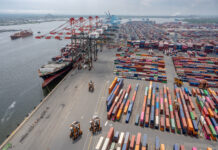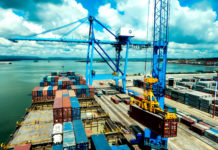
The Digital Container Shipping Association (DCSA) has unveiled a new Just-in-Time Port Call programme to facilitate vessel speed optimisation and reduce CO2 emissions.
DCSA, a neutral and non-profit group established to further digitalise the container shipping industry, has published standard data definitions for the port call process, which is the first publication of the DCSA Just-in-Time (JIT) Port Call programme.
Nine container shipping companies are members of DCSA and they will be a crucial factor for JIT port calls, according to Erwin Verstaelen, chief digital & innovation officer for Port of Antwerp, who said, “There are a lot of moving parts and stakeholders that need to work together to enable a JIT port call. With commitments from the world’s top carriers, DCSA’s digital standards are key to enabling this collaboration.”
By moving container shipping towards a JIT port call process, DCSA port call standards will enable container ships to optimise their steaming speed, thereby lowering fuel consumption and reducing CO2 emissions.
“Port call optimisation will enable terminal operators to provide many benefits to their shipping customers,” commented Frank Kho, CEO of Terminal Industry Committee 4.0 (TIC4.0), who went on to explain, “With just-in-time port calls, arrival times and berth space can be optimally managed. This means capacity, equipment and staffing can be more accurately estimated and planned.”
To provide a global industry framework that preserves existing investments, DCSA port call data definitions align with International Maritime Organization (IMO) and International Taskforce Port Call Optimization (ITPCO) Just In Time (JIT) Arrival Guide standards.
The DCSA Port Call Data Definitions will allow carriers, ports and terminals to exchange event data in a uniform way, enabling digital planning and operational optimisation, according to an announcement.
Thomas Bagge, CEO of DCSA, highlighted the eco-friendly aspect of the project, saying, “Enabling a vessel to optimise its speed during the voyage to arrive just in time at the Pilot Boarding Place, when berth availability is ensured, will significantly reduce the amount of fuel consumed.”





